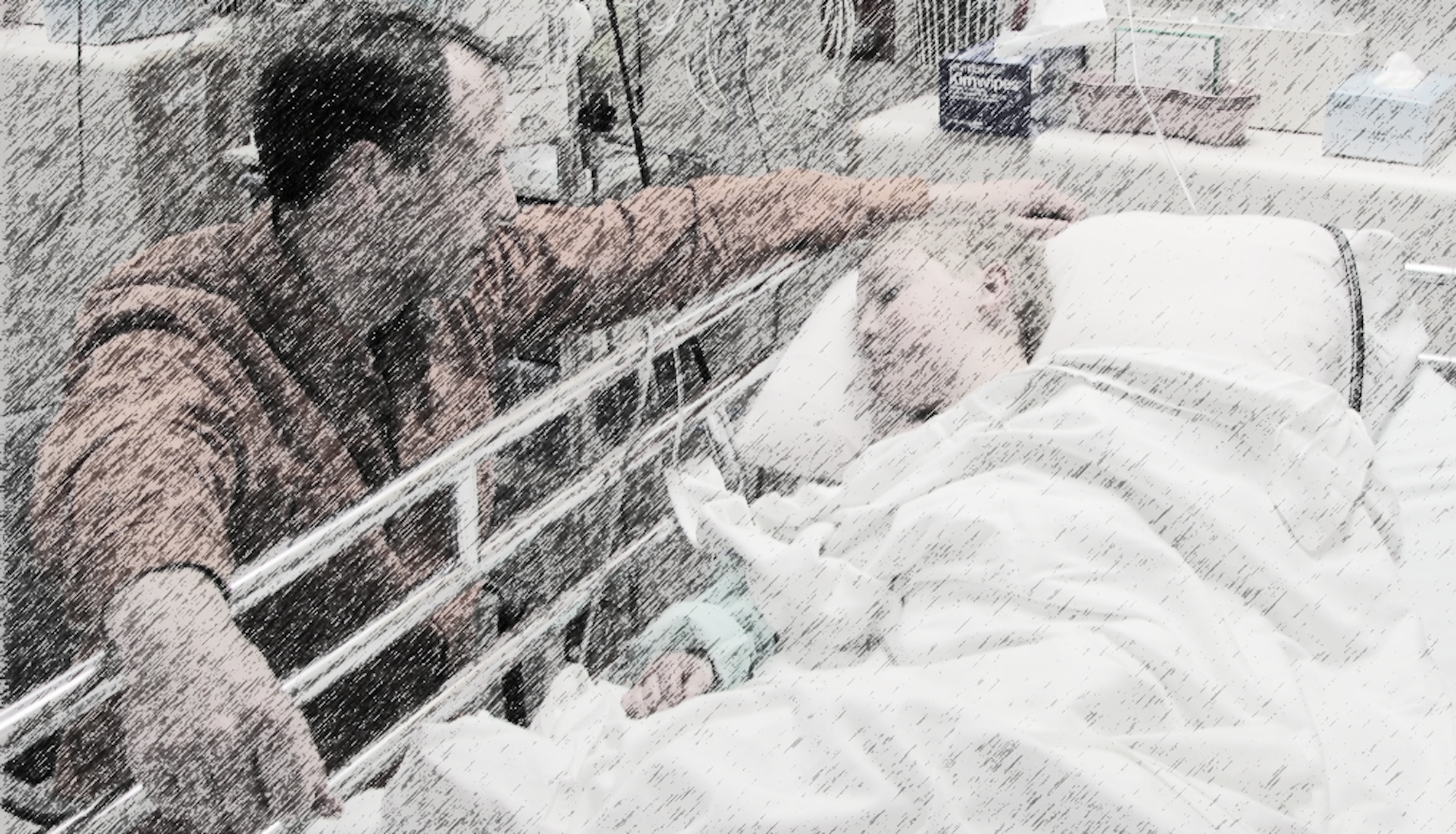
The Terrifying Clarity of Purpose
Purpose to an entrepreneur is like love to a married couple: Everyone tells you you need it, but the advice is empty until you live it.
It’s a tenet of entrepreneurship, evangelized in countless blogs and startup guides. Most will simply say you must have it; a noble purpose catalyzes your venture. While accurate, I find this advice seriously understates the true nature of purpose and paradoxically, may even mislead entrepreneurs. My discovery of purpose began as a restless dropout and culminated at the bedside of my son. I learned that purpose fully realized is both terrifying and liberating.
I want entrepreneurs to understand the experience of purpose. It both carries you and weighs you down as it waxes and wanes throughout your career. It’s often described as a calling but more often it whispers. Learning how to listen to it is a big part of the experience. If neglected, it escalates, nagging and prodding you to action. It may act destructively if you turn a deaf ear. But when it snaps into place — when your activities are aligned with your unique purpose — it rewards you with drive, clarity and single mindedness. Ironically, that clarity may even drive you away from entrepreneurship and that’s okay.
Finding your purpose may feel like a quixotic quest, but the varieties generally distil to a fairly short list of stages. I don’t want this to be misconstrued as some ladder to climb. Purpose is deeply personal. For some, entrepreneurship is a lifestyle; for others, it’s the big problem unsolved. And there may be no good reason to migrate from one calling to the other. This is why understanding purpose as experience is so important.
Younger entrepreneurs will find this perplexing, but I spent most of my academic years completely unaware that entrepreneurship is a profession. I come from a family of teachers, and startups never really entered the conversation. I bounced around different academic programs trying to find my calling: engineering, science, business, music. The dropout-entrepreneur is a well worn cliché; I like to think three dropouts give mine a unique spin. While I did accumulate enough credits along the way to graduate, I left school still trying to find my way. As luck would have it, in my final year of university I picked up a course in entrepreneurship. After so many years of searching, it was almost like a religious experience. Finally, there seemed to be a profession that combined everything that I wanted to do, bringing to bear everything I had to give. I was hooked.
I suspect that for many entrepreneurs, particularly newcomers, this call to entrepreneurship is what drives them. If you’re a generalist and yearn for autonomy (however naive that notion is in reality), working for yourself seems a great fit. At this stage, many trappings of entrepreneurship are unavoidable, even embraced. Rather than choosing a problem, I let my first customers choose me, and it was a privilege. Purpose was found in the day-to-day activities, not the specifics of the venture. These are the values that are often celebrated with lifestyle entrepreneurs. Once it starts to roll, the autonomy and flexibility frees you to explore your interests more broadly. My partners and I would build for our customers during the day and for ourselves at night. These years were formative in my development and paid dividends later on.
But eventually, I found the call to entrepreneurship insufficient. While there was undoubtedly autonomy over aspects of my professional life, in reality I was simply working for a different kind of boss — bosses, really, as there were many customers, each pulling in a different direction. With multiple customers and problems to tackle, you become more discriminating. We chose one customer and our purpose changed.
Focusing on your customers is another cherished tenet of entrepreneurship. After spending years working with companies of all shapes and sizes, we started homing in on the music industry and recording artists. Although they’re idolized by their fans, recording artists are often treated as industry pions. Power resides with the money. This seemed to us unjust and counter-creative, so we adopted the purpose of artists as our own. The internet offered an opportunity for them to seize control of their business and balance the power. We set out to create a much closer connection between artists and fans. The company now operates as The Official Community Corporation.
When there’s an alignment of purpose, you and your customers are inextricably joined. My co-founder, Kevin Leflar, has been an advocate of artists for decades, starting as a tour manager. For Kevin, their purpose is deeply resonant with his own. It’s a big reason why he succeeds. Over the years, Kevin and OCC have redefined the artists’ role in all aspects of their business, representing many of the biggest names in music.
But while I believe in that purpose for Kevin, it wasn’t my own. Towards the end of my time with the company, my wife and I had our first child, Sam. He was born with a raft of congenital heart defects, fighting a war of surgeries and medical procedures that continues to this day. Sam had a profound impact on my life, and inevitably on my entrepreneurship. After Sam was born, those whispers of purpose started getting more insistent and I felt increasingly out of place.
Once the lifestyle of entrepreneurship becomes ingrained, deeper creative opportunities emerge. You look for an opportunity to make a unique contribution, as Steve Jobs said, to “put a dent in the universe.” By this point, we had tackled a number of large-scale media and commerce projects. I had an insight about how the knowledge engineering work we were doing could be automated and leveraged across a range of applications. It was also easy for me to reconcile this work to applications in healthcare, even if we weren’t pursuing those applications directly. With Yvan Couture, our lead investor and now CEO, Primal was founded to pursue this big problem. The combination of a unique purpose, a big problem, and visionary investors was catalytic. Primal continues to build one of Canada’s more formidable portfolios of patents and applications in artificial intelligence.
For many years, I found purpose in Primal. Sam’s condition stabilized and our hospital visits became less frequent, more routine. When you’re living with a serious health condition, normality is dangerously alluring. But unfortunately, the reality of my son’s health increasingly pulled my attention away from Primal. Eventually, those whispers became deafening, like a wailing siren. I needed to draw a more direct line between my work and my family.
I’m not one to dignify coincidences, but I’m also not immune to the effects when the universe kicks me in the ass. The day I resigned from Primal, Sam collapsed on the couch, complaining of symptoms associated with heart attack and stroke. I rushed him to the ER. As I sat by my son’s bed, surrounded by the healthcare professionals and technology that sustain him, I felt our reprieve had ended. At that moment, I felt immersed in true purpose.
I’ve always felt driven in my work. But in hindsight, this succession, the increasing gravity of each stage, is what truly defines the character of purpose, its truth. It’s terrifying because it’s authentically yours. It’s not a choice; there are no failures or pivots at this level. When it finds you, it doesn’t let go. It can be shared — it must be shared — but it can’t be abandoned. That’s terrifying but so wonderfully clear and unambiguous.
But true purpose is also liberating because it absolves you from the trappings of inauthentic purpose. It isn’t found in the lifestyle of entrepreneurship, in your talents or customers or big ideas. True purpose elevates you above those parochial concerns. You have to let these things go. You’re freed to make the right decisions to serve your purpose, rather than the decisions that a lesser purpose entails. And the decision to start a company might not be the best way to do that. You might find an existing company to join that is well aligned with what you need to do. Perhaps you’ll find it in some other institution, in social or political advocacy, or the bedside of a loved one.
Fortunately, after a battery of tests returned negative, Sam and I were discharged; another reprieve. I swore I would never succumb to complacency again.
Over the months since leaving Primal, I spent a lot of time exploring the different ways I can support Sam and our family. Sadly, there are many problems to weigh. Our healthcare system is fraught with challenges that inevitably put our lives at risk. I decided to start a new company as the most productive way I can make an impact. I’ve seen firsthand how small teams and community can move an industry. I know we’ve only scratched the surface of the inventive uses of AI to illuminate knowledge and keep our families safe. Perhaps most importantly, solutions can’t be confined within the existing boundaries of healthcare or delegated entirely to its practitioners. It requires innovation, new perspectives, and many hands.
My purpose is the health and well-being of our children. If you share it and want to explore ways to we can collaborate, I hope you’ll contact me.
